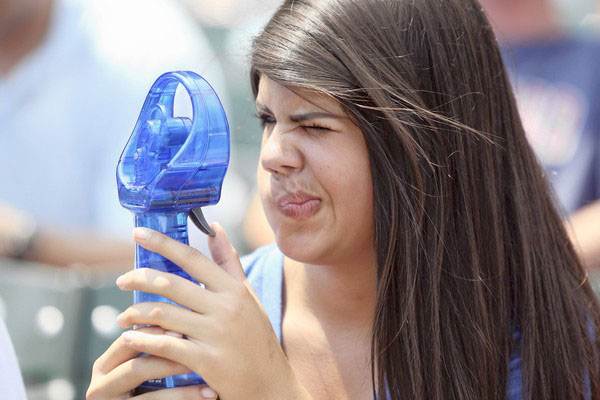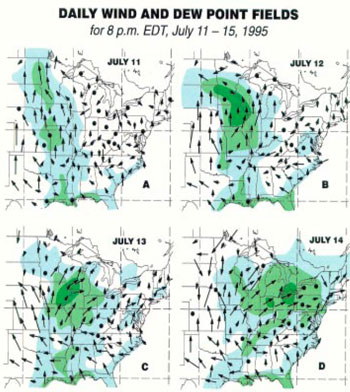
Yesterday was hot, reaching 93 degrees. Which in retrospect doesn’t sound like a lot, but more impressive, or depressing, was the low of 81 degrees, or eight degrees higher than Sunday’s low. This was likely due to the humidity: an average of 68 percent, compared to Sunday’s average of 58 percent.
A low of 81 degrees is comparable to the lows during the terrible heat wave of 1995, when the mercury bottomed out at 81 and 84 degrees during its peak (the highs were considerably hotter, breaking 100 on both days). That was part of the danger: high humidity, with dew points near 80 degrees, ensured that the heat didn’t let up overnight. Today in Minneapolis the dew point hit 82 degrees, making it the most humid day in the city’s history.
One of the reasons for the oppressive humidity this week is the floods that hit the Plains states and upper Midwest this spring, as Dr. Jeff Masters points out: "with hundreds of thousands of acres of farmland still inundated by flood waters, and soils saturated over much of the Upper Midwest, there has been plenty of water available to evaporate into the air and cause remarkably high humdities."
This was one of the causes of the 1995 heat wave: supersaturated soil on the farmlands west of Chicago. According to the NOAA post-mortem (emphasis mine): "The principal cause of the July 1995 heat wave was a slow-moving, hot, and humid air mass produced by the chance occurrence at the same time of an unusually strong upper-level ridge of high pressure and unusually moist ground conditions.
You can see the humidity blow up as the wave passed over Iowa and the Mississippi River:

If you’re not familiar with the 1995 heat wave, this piece about Eric Klinenberg’s book Heat Wave is a good place to start. The deaths immediately caused by the heat wave are notorious, though not the most for an American city—more died in the 1955 Los Angeles heat wave and the 1972 New York heat wave.
Klinenberg attributes the deaths in part to changing demographics:
One reason so many people die in heat waves is that more Americans seem to be living and dying alone than ever before. In San Francisco, for example, officials report that they discovered almost as many cases of people who died alone, with no one to claim their bodies and estates, during the first six months of 2000 as they had in the previous decade. In Chicago, one month after the 1995 heat wave, county officials buried 68 people, most of them heat-wave victims, in a 160-foot-long trench.
Which should raise concerns as boomers start turning into seniors, as the CDC’s Mike McGeehin points out:
We’re also living to older ages, and we’re more urban now than we have been in the history of the human species. That intense crowding can combine with the heat island effect in big cities. Our elderly people are also more isolated than they have been in the past, so those factors can play a part, too.
Photograph: Chicago Tribune



